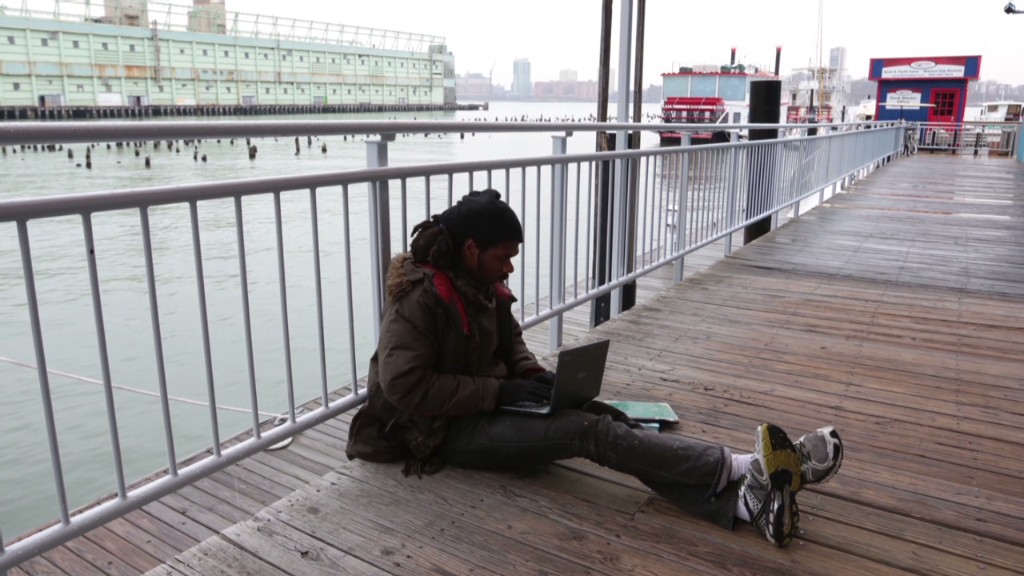
They may have dorm rooms to sleep in during the school year, but many college students are technically homeless -- with no place to call home when classes aren't in session.
Jessie McCormick, a senior at Aquinas College in Grand Rapids, Mich., has been homeless since running away right before her senior year of high school. Financial aid covers about 85% of her tuition and housing, and odd jobs that pay minimum wage, like helping out at the bookstore and setting up special events, pay for the rest.
McCormick was shocked to learn, however, that her housing isn't covered during campus breaks. Instead, she must pay a fee of $12 to $24 a night (depending how far in advance the request is made), which she can't always afford. Over Christmas, the school shuts down completely and no one can stay on campus -- not even for a fee.
Related: Student homelessness hits record high
During breaks, McCormick has slept outside on campus, signed up for free, school-sponsored community service trips or stretched her budget to pay the fee when she can stay on campus. Meanwhile, international students and in-season athletes are able to stay on campus during breaks other than Christmas for free.
In October, McCormick launched a petition urging Aquinas to provide free housing to homeless students during breaks. Even though she will graduate soon, she said she knows of at least nine other students who don't have homes to return to this Christmas. Her petition has already received more than 100,000 signatures, including some from students at other colleges who say they too are homeless.
A spokeswoman at Aquinas said McCormick's efforts have prompted it to examine its policies and talk with other schools and experts about the best way to provide options for homeless students. Until a solution is found, the school will work with students individually, and McCormick will be provided a hotel room to stay in this Christmas. Aquinas says that so far, only one student (other than McCormick) has indicated they need housing this Christmas and the school has offered that person a hotel room as well.
"We believe that this is a problem that small colleges must address," the school said in a statement. "In the interim, we are committed to making housing arrangements for any of our homeless students who need it this year."
Related: Government reports homelessness estimate
College homelessness is a serious issue that is often overlooked, says Barbara Duffield, policy director of the National Association for the Education of Homeless Children and Youth.
"There's an assumption that if you're homeless, you're so focused on basic needs like food and shelter that school isn't a concern," said Duffield. "But for these youth, education is the answer -- the jobs that are available don't pay good wages if you don't have a degree, so [education] is the only way out of their situation."
There's no concrete estimate for the number of homeless college students nationwide, but 58,158 college applicants indicated that they were homeless on federal financial aid forms for the 2012-13 academic year -- up 8% from 53,705 in the previous year, according to federal data Duffield obtained through a Freedom of Information Act request. That number is likely understated, however, since some people may be staying in a car or motel and don't realize they are technically homeless, or don't want to admit to it, says Duffield.

Juaquin Moraga, 19, has been homeless since leaving home at 16. His oboe skills won him a full scholarship to the music program at California State University, Long Beach. Required to live on campus his first year, he found himself in the same situation as McCormick. During breaks, he slept outside, crashed on friends' couches or paid a fee to stay on campus if he was able to scrounge up enough money.
Related: Pay $2,000 to be homeless
California State University, Long Beach, said it doesn't include breaks when calculating the cost of housing for students, since most students don't want to stay on campus. Students can apply to remain on campus during breaks but must pay a fee of between $45 and $400 (depending on the break and when the request is made).
The school wouldn't comment on Moraga's situation citing privacy laws, but it said it will work with any student to help them find housing during breaks if they need it -- whether that means connecting them with a local shelter, waiving the fee for staying on campus or giving them money to pay the fee. Moraga was embarrassed to come forward and explain to the school he was homeless, however.
While many colleges address this issue on a case-by-case basis, some schools are tackling it head on. Western Michigan University, for example, launched a financial aid and outreach program in 2008 for students who have been in foster care or are homeless for other reasons, and it allows them to stay on campus for free during breaks.
And more could follow.
Related: Exec learns firsthand how the homeless live
Senator Patty Murray of Washington recently introduced legislation to Congress that would amend the Higher Education Act and require colleges to "develop a plan to assist homeless and foster youth to access housing resources during and between academic terms."
The bill would also require colleges to provide a point of contact for homeless students, and would mandate that schools ask questions about homelessness in college applications so they can help them get access to financial aid.
"[The legislation] reduces some of the incredible barriers that homeless and foster care youth face to make a better life through higher education," said Senator Murray.
